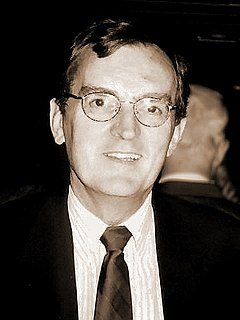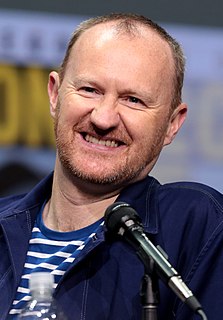Top 556 Portrait Quotes & Sayings - Page 10
Explore popular Portrait quotes.
Last updated on November 9, 2024.
To ignore, repress, or dismiss our feelings is to fail to listen to the stirrings of the Spirit within our emotional life. Jesus listened. In John's Gospel we are told that Jesus was moved with the deepest emotions (11:33)... The gospel portrait of the beloved Child of Abba is that of a man exquisitely attuned to His emotions and uninhibited in expressing them. The Son of Man did not scorn of reject feelings as fickle and unreliable. They were sensitive antennae to which He listened carefully and through which He perceived the will of His Father for congruent speech and action.
Steve Sailer gives us the real Barack Obama, who turns out to be very, very different - and much more interesting - than the bland healer/uniter image stitched together out of whole cloth this past six years by Obama's packager, David Axelrod. Making heavy use of Obama's own writings, which he admires for their literary artistry, Sailer gives the deepest insights I have yet seen into Obama's lifelong obsession with 'race and inheritance,' and rounds off his brilliant character portrait with speculations on how Obama's personality might play out in the Presidency.
How sad it is!" murmured Dorian Gray with his eyes still fixed upon his own portrait. "How sad it is! I shall grow old, and horrible, and dreadful. But this picture will remain always young. It will never be older than this particular day of June… . If it were only the other way! If it were I who was to be always young, and the picture that was to grow old! For that—for that—I would give everything! Yes, there is nothing in the whole world I would not give! I would give my soul for that!
I imagine John Watson thinks love’s a mystery to me, but the chemistry is incredibly simple and very destructive. When we first met, you told me that a disguise is always a self portrait, how true of you, the combination to your safe – your measurements. But this is far more intimate. This is your heart, and you should never let it rule your head. You could have chosen any random number and walked out of here today with everything you worked for. But you just couldn’t resist it, could you? I’ve always assumed that love is a dangerous disadvantage. Thank you for the final proof.
Why are we worn out? Why do we, who start out so passionate, brave, noble, believing, become totally bankrupt by the age of thirty or thirty-five? Why is it that one is extinguished by consumption, another puts a bullet in his head, a third seeks oblivion in vodka, cards, a fourth, in order to stifle fear and anguish, cynically tramples underfoot the portrait of his pure, beautiful youth? Why is it that, once fallen, we do not try to rise, and, having lost one thing, we do not seek another? Why?
I wanted to write about the time when science became modern, around the 1950s. Right after physicist J. Robert Oppenheimer, science started being so politicized and used as such a political weapon. When my father, who is a scientist, tells me about those years, I get a competing portrait of people who were expected to behave normally and be decent respectable members of society and who were also allowed this freedom to think in big and expansive ways. Now, when you think about people who work in labs, they're allowed to be socially inept in a very fundamental way.
Not only did Mao Zedong Thought lead us to victory in the revolution in the past; it is - and will continue to be - a treasured possession of the Chinese Communist Party and of our country. That is why we will forever keep Chairman Mao's portrait on Tiananmen Gate as a symbol of our country, and we will always remember him as a founder of our Party and state. Moreover, we will adhere to Mao Zedong Thought. We will not do to Chairman Mao what Khrushchev did to Stalin.
the growth of intimacy is like that. First one gives off his best picture, the bright and finished product mended with bluff and falsehood and humour. Then more details are required and one paints a second portrait, and a third – before long the best lines cancel out – and the secret is exposed at last; the planes of the pictures have intermingled and given us away, and though we paint and paint we can no longer sell a picture. We must be satisfied with hoping that such fatuous accounts of ourselves as we make to our wives and children and business associates are accepted as true
With Jane Birkin, we had a scene from a film called Jane B. by Agnès V. - a portrait I made in '87. We had a casino scene, surrealistic, in which we had some naked people gambling. Jane Birkin was the card dealer and I was the player. I had beautiful jewelery around me, and when I lost I would take the jewelery and say, Service - being very generous, because it was very expensive jewelery. I would say, Tip.
Poets are not so scrupulous as you are. They know how useful passion is for publication. Nowadays a broken heart will run to many editions." "I hate them for it," cried Hallward. "An artist should create beautiful things, but should put nothing of his own life into them. We live in an age when men treat art as if it were meant to be a form of autobiography. We have lost the abstract sense of beauty. Some day I will show the world what is it; and for that the world shall never see my portrait of Dorian Gray.
I think self-portraits are very difficult. I’ve always seen mine as straightforward, very stripped down, hair pulled back. No shirt. Whatever light happened to be available. I’d want it to be very graphic – about darkness and light. No one else should be there, but I’m scared to do it by myself. I’ve been thinking about it for a long time. The whole idea of a self-portrait is strange. I’m so strongly linked to how I see through the camera that to get to the other side of it would be difficult. It would be as if I were taking a photograph in the dark.
It’s not easy to find old-school journalism in true crime … yet with Lethal Intent, author Sue Russell proves how integrity, tenacity, brutal truth and honest reporting become essential components to what is a riveting—if not terrifying—narrative of America’s most hated ‘monster,’ Aileen Carol Wuornos. It’s not easy humanizing serial killers, but through an objective lens, clear and defined, Russell paints a graphic portrait of Wuornos’ evil intentions and rough life—a true page-turner, breathless, intense—but also important.
There should be a statute of limitation on grief. A rulebook that says it is all right to wake up crying, but only for a month. That after 42 days you will no longer turn with your heart racing, certain you have heard her call out your name. That there will be no fine imposed if you feel the need to clean out her desk; take down her artwork from the refrigerator; turn over a school portrait as you pass - if only because it cuts you fresh again to see it. That it's okay to measure the time she has been gone, the way we once measured her birthdays.
Sitting for a picture is morbid business. A portrait doesn't begin to mean anything until the subject is dead. This is the whole point. We're doing this to create a kind of sentimental past for people in decades to come. It's their past, their history we're inventing here. And it's not how I look now that matters. It's how I'll look in twenty-five years as clothing and faces change, as photographs change. The deeper I pass into death, the more powerful my picture becomes. Isn't this why picture-taking is so ceremonial? It's like a wake. And I'm the actor made up for the laying-out.
He examined the chess problem and set out the pieces. It was a tricky ending, involving a couple of knights. 'White to play and mate in two moves.' Winston looked up at the portrait of Big Brother. White always mates, he thought with a sort of cloudy mysticism. Always, without exception, it is so arranged. In no chess problem since the beginning of the world has black ever won. Did it not symbolize the eternal, unvarying triumph of Good over Evil? The huge face gazed back at him, full of calm power. White always mates.
I'm trying to write truthfully about life, and naturalism, or the way people normally talk in movies, is a convention. The way I write is about life and is quite truthful, and there is a kind of brutal side to the relationship, and to the feelings, that makes it somewhat painful, but I think it's a very intense portrait of the relationship of two people. And a bit about what people feel like when they're alone, because it all takes place in one day, and during the day, they spend a lot of time alone in their different - you get to imagine what their fantasy lives are like.














